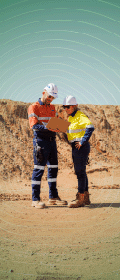A groundbreaking youth program in the remote communities of western South Australia is promising to become a model for resources companies wanting to genuinely connect with their Indigenous neighbours. That is the outcome already from the program in just its first few months of early work. An initiative of Adelaide-based energy company Beach Petroleum and Save the Children, the three-year program was launched late last year with a A$600,000 grant from Beach – representing one of the State’s largest single corporate expressions of assistance for resources-linked remote communities.
The program aims to provide practical ‘life skills’ for young people in Ceduna, Koonibba, Yalata and Oak Valley.
Organisers announced today that in just four months since the launch, program staff had already held an intensive series of meetings with elders and community groups in the four communities. These talks had successfully provided sufficient feedback to lay the groundwork for the development of a strategic Plan of Action to guide mentoring and educational activities for the first program in Yalata.
“Under the protocols of the sponsorship, we have been given sufficient time to go out and meet with different groups to gain a real presence in the four communities and – more importantly – to gain their trust and respect,” Save the Children’s Programs Manager, Ms Joan O’Connor, said. “We have hired a full-time Program Coordinator – based in Ceduna – and this full-time, on the ground presence is making a measurable and positive difference in the willingness of individuals and communities to participate.”
The newly appointed Program Coordinator, David Peedom, has long experience in negotiating and consulting with indigenous communities in Australia and overseas, bringing a level of confidence in the initial stages of work.
“Before now, I’ve been going out to Ceduna six or seven times a year to talk with local families and be advised of their needs. But having someone permanently there and accessible to the communities has been a major plus for us,” O’Connor said.
Save the Children has been involved in the Ceduna area for more than 20 years, through various youth health and nutrition programs, and a soon-to-be-launched parenting program. But O’Connor says the youth program may open the door to a whole new level of support – both in the communities of western South Australia, and further afield.
“This is, to my knowledge, the first time that a South Australian resources company has become involved in this kind of program at such a grassroots level,” she said. “It has really stirred the corporate community to do more on issues of social responsibility.”
Next month, Peedom and a small team will work with community representatives to develop a long-term Plan of Action for youth development in Yalata, which will also provide a model for the other three communities.
“Although this is initially a three-year program, we are laying the foundations for a concerted program of support over five to ten years and beyond,” O’Connor said.
Save the Children has already identified 10 young people with the potential to become mentors to specific groups within the community. These people will be the first beneficiaries of a new TAFE certificate designed to improve community-appropriate mentoring skills, leading eventually to other qualifications addressing specific education needs and practical skills for job-seeking and employment.
The program also proposes a number of innovative uses of sport, music and recreational activities as gateways for the mentoring process.
As a result, Save the Children’s efforts are attracting support from several State Government Departments, Families SA, the Indigenous Coordination Centre and the Far West Women’s Group.
“We are focused on the individual communities becoming an integral part of the decision-making process – as opposed to historically, just being told what to do,” O’Connor said.
The South Australian program is attracting wider audience, with Save the Children already being approached by a number of mining companies wishing to support indigenous communities in Western Australia, where the organisation conducts similar programs in the Kimberleys.
“This program is a new venture in SA, but we are winning strong support from the State Government and are very confident that it will generate more attention and support from a range of SA companies in the future,” said Ms Michele Leonard, Save the Children’s Australia Program General Manager. “Beach Petroleum’s commitment and ongoing backing is a bold step but demonstrates how a resources company can work together with local remote area communities to make a difference in the lives of people who don’t normally benefit from this kind of initiative. Such corporate vision is inspirational.”









